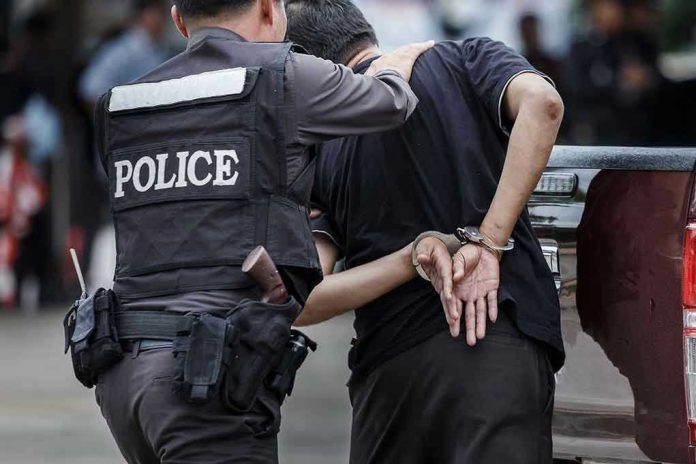
Federal agents in Texas just executed the largest strike yet on a notorious South American gang hiding in plain sight—what unfolded in San Antonio may signal how America will confront transnational crime for years to come.
Story Snapshot
- Federal, state, and local forces raided a San Antonio food truck hub, arresting over 140 undocumented immigrants linked to Venezuela’s Tren de Aragua gang.
- The operation marks the inaugural mission of the Homeland Security Task Force in South Texas, established under a recent executive order.
- Law enforcement seized vehicles and property, targeting a gang accused of violent crimes, human smuggling, and exploiting migrant routes into the U.S.
- Community anxieties, political debate, and questions over future enforcement swirl as investigations widen and more raids loom.
Federal Strike Exposes Hidden Gang Networks in Texas
In the predawn hours of November 16, 2025, San Antonio’s North Side transformed into a showcase of modern law enforcement muscle. Helicopters circled above a bustling food truck lot on San Pedro Avenue; marked and unmarked police vehicles swarmed the area. By dawn, more than 140 undocumented immigrants had been detained, many suspected of ties to Venezuela’s Tren de Aragua—a criminal syndicate that law enforcement officials now recognize as one of the fastest-growing, most adaptable organized crime groups to reach American soil.
The raid unfolded with a precision that belied months of intelligence gathering by the Texas Department of Public Safety. Federal agents, working with state and local police, executed a court-approved search warrant, targeting not just individuals, but the very infrastructure that allowed Tren de Aragua to embed itself within immigrant communities. The scene was chaotic, but the message was controlled: no longer would transnational gangs exploit the shadows of America’s migration crisis without consequence.
Tren de Aragua’s Origins and U.S. Expansion
Tren de Aragua did not emerge from the typical cartel blueprint. Its roots trace to Venezuela’s prison system, where it evolved from a survival network into a sprawling criminal enterprise. The gang leveraged political instability and mass migration, spreading across South America and, more recently, into key U.S. cities by blending with migrant flows. San Antonio, with its food trucks and car lots, became an unlikely nerve center—its legitimate businesses providing both cover and opportunity for illicit operations. Law enforcement agencies, long attuned to Mexican cartels, found themselves confronting a new kind of adversary: decentralized, ruthless, and uniquely adept at exploiting the vulnerabilities of border enforcement.
In recent years, Texas authorities have ramped up operations against cartel-linked money laundering and arms trafficking. However, targeting Tren de Aragua represented a shift in scope and strategy. With the Homeland Security Task Force newly minted by executive order, the raid was both a tactical and symbolic escalation—a warning shot aimed squarely at criminal organizations banking on bureaucratic hesitancy and jurisdictional confusion.
Stakeholders, Community Impact, and Political Undercurrents
The operation’s aftermath rippled far beyond the food truck lot. Law enforcement seized vehicles and property, placing those arrested—men and women from Venezuela, Honduras, Mexico, and other nations—into ICE custody. Early statements from the FBI and Homeland Security Investigations painted the raid as a model for future coordinated actions, with officials touting the removal of sex offenders, fugitives, and suspected murderers from the community. Texas Governor Greg Abbott, quick to claim credit, signaled that more such operations were imminent, a stance that resonated with voters demanding tougher border enforcement.
Yet, inside San Antonio’s immigrant neighborhoods, pride in safer streets mingled with fear and uncertainty. Local businesses faced economic disruption, and families worried about the distinction—often blurred—between criminal targets and the broader undocumented population. Immigration advocates warned against conflating gang crackdowns with legitimate asylum claims, urging policymakers to separate violent actors from vulnerable migrants fleeing chaos abroad. This tension—between security and compassion, enforcement and due process—now defines the region’s political conversation.
What Comes Next for Texas and the Nation
With over 140 arrested, including alleged child predators and murderers, the short-term impact is clear: Tren de Aragua’s local operations suffered a major blow, and the message to other gangs is unambiguous. The long-term implications, however, remain uncertain. Federal officials believe their new task force model, built on unprecedented interagency coordination, will deter further gang expansion and set a national precedent. But as investigations continue, experts warn that aggressive enforcement may push criminal networks further underground, making them harder to uproot in the future.
For now, the Homeland Security Task Force remains on high alert, following fresh leads and preparing for further raids. Community leaders brace for social and economic fallout, while politicians from both parties weigh how to balance border security with humane immigration policy. The raid on San Antonio’s North Side may prove a turning point—not just for Texas, but for how America confronts the shadowy threats that cross its borders in the 21st century.




